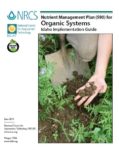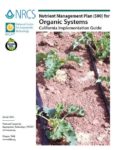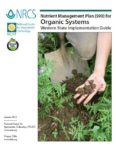The educational materials listed on this page are about Manure Management.
Manure management is critical on any type and scale of farm. Many farms that do not have livestock use off-farm manure for fertility purposes, while farms with livestock are challenged by storing manure and applying it to land in a sustainable manner. Sometime applied to fields as raw manure, there are many other types and uses of manure, such as horse manure compost, cow manure compost, goat manure fertilizer, organic manure and compost manure. Compost implies the manure is not raw but has been static or turned for a period of time, and therefore has broken down. Proper manure composting, including careful temperature management, will usually eliminate pathogens. If all harmful pathogens have been removed then composting horse manure to generate rich horse manure for garden spaces may be a great benefit for organic matter. Likewise, cow manure fertilizer could be good for soil fertility when used properly. There is not one single compost that is the best manure for your farm or garden, but if you learn the practices of how to compost horse manure, you are well on your way to finding out. Key practices include manure management, grazing management, nutrient management, composting, soil quality/health, riverbank protection, water management, nutrient cycling.
The Small Ruminants Topic Room is a useful starting place if you manage small ruminants, like goats and sheep, and want to find resources for manure management of these animals. If you want to understand the role of water in a farm system and how manure management may affect your water, check out Smart Water Use on your Farm or Ranch. SARE’s book Building Soils for Better Crops can provide useful information on how to reduce manure and nutrient runoff in order to improve soil fertility.
Showing 1-3 of 3 results

Nutrient Management Plans: Idaho
This is a collaborative project to build the capacity of conservation professionals to assist organic and transitional farmers in planning and implementing conservation practices through the Environmental Quality Incentives Program Organic Initiative. This guide is part of a series of guides created by Oregon Tilth for use by NRCS staff in the Western Region. This document is […]

Nutrient Management Plans: California
This is a collaborative project to build the capacity of conservation professionals to assist organic and transitional farmers in planning and implementing conservation practices through the Environmental Quality Incentives Program Organic Initiative. This guide is part of a series of guides created by Oregon Tilth for use by NRCS staff in the Western Region. This document is an instruction […]

Nutrient Management Plans: Western Region
This document is an instruction guide for creating and implementing a nutrient management plan on certified or transitioning organic lands in the Western Region.